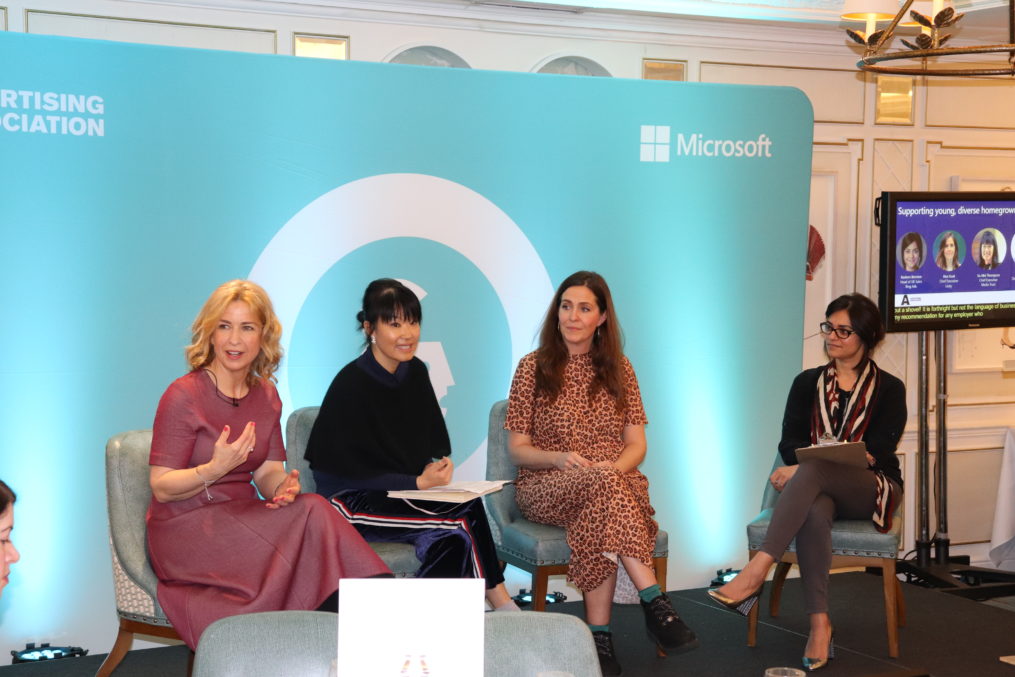Already a member? Sign in below

The advertising industry is taking steps to mitigate challenges around talent, both homegrown and international. If nothing else, Brexit has brought a sharper focus on the need for the industry to develop its domestic talent, and it was this issue that was the subject of an expert panel at a joint Advertising Association and Microsoft Luncheon at Ad Week Europe on Wednesday.
Ad Week co-founder Matt Scheckner began the luncheon with a discussion of the long partnership between Ad Week, Microsoft and the Advertising Association, as something of a continuation of the week’s theme of collaboration in the face of headwinds surrounding Brexit.
Ahead of the panel, Advertising Association Chief Executive Stephen Woodford reiterated that collaboration is vital if we are to remain one of the hubs for advertising excellence globally:
“This lunch, in a sense, is a mirror image of the lunch we had this time last year, where we were talking about international talent [as highlighted in our latest Exports Report]. The world’s best talent comes to work in the UK. That is a fantastic thing, [but] that is a thing that will potentially change. We’re going to have a much more restrictive immigration policy, so the flipside of that is what we need to do to develop UK talent.”
He argued that by using the advertising industry as a litmus test for what will happen with Brexit, the government had thrown a challenge back at industry practitioners: Do more to develop homegrown talent, particularly in a way that reflects society in the UK more accurately than it does at present.
The panel, headed by Ravleen Beeston, Head of Sales for Bing Ads, began by discussing the extent to which the industry can even measure the scale of the issue. Karen Fraser, director of the industry’s think tank Credos, pointed out that as a result of everything from the personal nature of the issue to changing socio-economic standards, it is extremely hard to quantify the issue:
“The truth is we’re not that good at knowing what the background is of people in our industry, particularly around socio-economic issues. We know that in the wider population about 9% of people have gone to a public school, but in the creative industries it’s about 38%. How do you ask that question?”
As an example, Beeston noted that a previous question that was included in any attempt to measure representation in the advertising industry inquired about the occupation of the primary breadwinner in the respondent’s household when they were 14. Over time, the answers to that question have become less relevant and useful when it comes to measuring whether someone came from a deprived or privileged background.
Great event with @ad_association on supporting young and diverse talent. @alexgoat from our member @LivityUK highlighting the focus should be as much about retaining diverse talent as it is in attracting them. #inspired #leadership #adweekeurope pic.twitter.com/4FXWZ8Uy6C
— MAAG (@MAAG_UK) March 20, 2019
The panel was also keen to stress that, while it is vital to measure the state of the current issue, it is equally vital to measure the outcomes of attempts to fix it. Su-Mei Thompson, Chief Executive of Media Trust, cited Stormzy’s scholarship that sends two black UK students to Cambridge which, while extremely worthy and worth celebrating, ignores the fact that other universities typically offer better paths into industry after graduation.
Alex Goat, Chief Executive at Livity, concurred, pointing out that while it’s relatively easy to measure hard skills learned through courses etc., it’s much harder to measure the other benefits of having a well-connected network of family, peers, and friends:
“So much of the work that we do is not just about the digital skills, it’s about how you bring this talent into this industry… and actually what are the networks you be able to need to get ahead. All of the soft skills are absolutely critical.”
She believes that schemes like those offered by Livity will ultimately be of benefit for the entire industry, not just in terms of retaining talent and representation, but financially. She shared the shocking statistic that there are more dedicated clothing lines for dogs than for people with disabilities:
“I think policy makers care about this because there is a skills gap. Lets just step back and think about the power and inputs of this sector; it has the power to shape societal actions… So it is so important that this sector is representative of broader society. Most of the black Asian and disabled people on TV are actually speaking to a script that doesn’t have a background or that reality.
“It can only be good for your business if you have a workforce that is representative of your consumers.. Only 4% of businesses offer goods and services designed to be inclusive for people with disabilities.”
She cited Unilever’s #Unstereotype campaign as an example of some excellent work in that area. Following the panel, a series of frank questions from an engaged audience reaffirmed Woodford’s opening comments that, while there is a lot of work still to be done, it is only through collaboration that significant changes can be made across the entire advertising industry.
Already a member? Sign in below
If your company is already a member, register your email address now to be able to access our exclusive member-only content.
If your company would like to become a member, please visit our Front Foot page for more details.
Enter your email address to receive a link to reset your password
Your password needs to be at least seven characters. Mixing upper and lower case, numbers and symbols like ! " ? $ % ^ & ) will make it stronger.
If your company is already a member, register your account now to be able to access our exclusive member-only content.